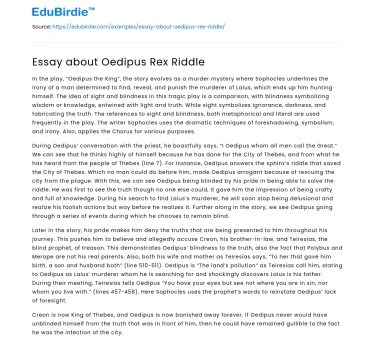In the play, “Oedipus the King”, the story evolves as a murder mystery where Sophocles underlines the irony of a man determined to find, reveal, and punish the murderer of Laius, which ends up him hunting himself. The idea of sight and blindness in this tragic play is a comparison, with blindness symbolizing wisdom or knowledge, entwined with light and truth. While sight symbolizes ignorance, darkness, and fabricating the truth. The references to sight and blindness, both metaphorical and literal are used frequently in the play. The writer Sophocles uses the dramatic techniques of foreshadowing, symbolism, and irony. Also, applies the Chorus for various purposes.
During Oedipus’ conversation with the priest, he boastfully says, “I Oedipus whom all men call the Great.” We can see that he thinks highly of himself because he has done for the City of Thebes, and from what he has heard from the people of Thebes (line 7). For instance, Oedipus answers the sphinx’s riddle that saved the City of Thebes. Which no man could do before him, made Oedipus arrogant because of rescuing the city from the plague. With this, we can see Oedipus being blinded by his pride in being able to solve the riddle. He was first to see the truth though no one else could, it gave him the impression of being crafty and full of knowledge. During his search to find Laius’s murderer, he will soon stop being delusional and realize his foolish actions but way before he realizes it. Further along in the story, we see Oedipus going through a series of events during which he chooses to remain blind.
Save your time!
We can take care of your essay
- Proper editing and formatting
- Free revision, title page, and bibliography
- Flexible prices and money-back guarantee
Later in the story, his pride makes him deny the truths that are being presented to him throughout his journey. This pushes him to believe and allegedly accuse Creon, his brother-in-law, and Teiresias, the blind prophet, of treason. This demonstrates Oedipus’ blindness to the truth, also the fact that Polybus and Merope are not his real parents. Also, both his wife and mother as Teiresias says, “To her that gave him birth, a son and husband both” (line 510-511). Oedipus is “The land’s pollution” as Teiresias call him, stating to Oedipus as Laius’ murderer whom he is searching for and shockingly discovers Laius is his father. During their meeting, Teiresias tells Oedipus “You have your eyes but see not where you are in sin, nor whom you live with.” (lines 457-458). Here Sophocles uses the prophet’s words to reinstate Oedipus’ lack of foresight.
Creon is now King of Thebes, and Oedipus is now banished away forever. If Oedipus never would have unblinded himself from the truth that was in front of him, then he could have remained gullible to the fact he was the infection of the city. To the fact that he may have never fulfilled his prophecy.






 Stuck on your essay?
Stuck on your essay?

